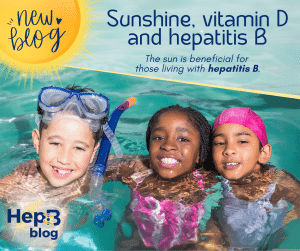
When you hear vitamin D you most notably think of the sun, or perhaps milk, or the small plastic bottles labeled with a bolded “D3” on store shelves. If you’ve ever been challenged by a trivia question asking what vitamin D does, you most likely know to say it helps build strong bones. In addition, vitamin D is a vital element that serves the immune, nervous and gastrointestinal systems, among our most important organs.
What you may not know about are the multiple functions vitamin D has in the body to regulate and maintain optimal health, especially for those living with chronic conditions such as hepatitis B.
The sun is the best source of vitamin D, and while everyone needs it, people living with hepatitis B need to pay extra attention to the summertime sun. Too much of a good thing can lead to harmful consequences, so it’s best to be aware of some precautions. Key considerations before spending time in the sun are hydrating with water, applying sunscreen to minimize risks of sunburn and skin cancer, and understanding the impact of exposure to sunlight on your body.
Being in the sun typically makes you thirsty. Drinking water instead of beverages with high sugars such as soda, sport and energy drinks, is better for the body and doesn’t leave behind any fats or byproducts that impede healthy liver function. Physicians from Mass General Brigham Hospital in Boston analyzed data from nearly 1000,000 woman and found that there may be a link between sugary drinks and liver disease (more here). The process of breaking down sugars leads to a build-up of unusable material that saturates the liver, inhibiting normal cells from growing and further exacerbating an already vulnerable liver. On average, the recommended daily water intake for women is around two liters, and for men, about three liters. While those are general guidelines, you may need more while in the hot sun. In addition to simply feeling thirsty, the Cleveland Clinic says that signs of dehydration include dry or sticky mouth, headache and reduced or dark-colored urine (more here).
Using sunscreen, wearing hats and protective clothing, and avoiding the midday sun are smart steps to ensure you are protecting yourself from the strong UV rays. The American Cancer Society says you should choose a sunscreen with broad-spectrum protection and an SPF of at least 30, according to the (more here). Keep in mind that the sun’s UV rays are strongest between 10 a.m. and 4 p.m. Therefore, limit your exposure to the sun during these hours and take moments to cool down in the shade.
Now, how can the sun actually help someone living with hepatitis B?
The link between vitamin D and hepatitis B has been studied for years, and evidence suggests the core of their relationship lies within the liver. Basically, the skin produces vitamin D3 from sunlight and the liver and kidneys convert it to the active form of vitamin D our bodies need (more here). And, the liver itself relies on vitamin D to behave and function efficiently. With this information, we are able to correlate why low vitamin D levels would negatively impact individuals with hepatitis B who already have a compromised liver.
Trends seen in bloodwork results of people living with hepatitis B show that those deficient in vitamin D have higher viral loads. The correlation between vitamin D levels and viral loads (more here) tells us that adequate vitamin D might play a role in lower viral load counts. And lower viral DNA is associated with lower risk of liver damage and cancer.
Not only is the sun beneficial for those living with hepatitis B, but it also has a strong connection to improving mood and mental health. The National Institute of Mental Health says that those living with can be susceptible to experiencing mental health struggles such as stress, depression or anxiety (more here). Spending time outside is a helpful activity to clear the mind, reset and process your thoughts and feelings in a healthy way. Whether you choose to enjoy a day at the lake, a walk through the neighborhood or read a good book on the patio, getting outside will support the best outcome of your hepatitis B status while boosting your mental health.
It’s hard to find something that’s free, easily obtained and life-sustaining, but the sun is an exception and is available most days, weather-dependent of course. If you have other health conditions that prevent you from being in the sun, or perhaps you don’t care for the heat, please talk with your doctor about a diet rich in vitamin D or supplementation to ensure you maintain sufficient levels.

